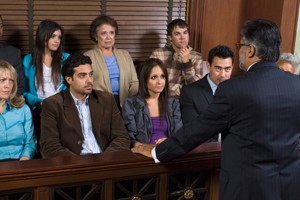 The complaint and answer have been filed, discovery is complete, and all motions have been heard. You’re still not ready for trial. There are a couple of important steps remaining.
The complaint and answer have been filed, discovery is complete, and all motions have been heard. You’re still not ready for trial. There are a couple of important steps remaining.
Jury Selection
A jury needs to be seated before attorneys can make their opening statements. Though the process can differ slightly from jurisdiction to jurisdiction, there are some general principles that routinely apply. The jury selection process, also known as “voir dire,” typically commences with the notification of a pool of potential jurors, usually pulled from the rolls of registered voters.
Persons called for jury duty will typically receive notice to appear at the courthouse on a specific date. When it appears that a lawsuit will go to trial, potential jurors are called into the courtroom, usually in smaller groups, and must submit to questioning by lawyers for all parties (and occasionally by the judge), in order to determine whether they can render an impartial decision based on the facts of the case. Attorneys for both sides have two different ways to exclude a potential juror:
- Peremptory challenges—A peremptory challenge can be for any reason. Each party typically has a limited number of peremptory challenges.
- Challenges for cause—A challenge for cause must be based on evidence that the potential juror cannot render an impartial decision. The judge will ultimately decide whether to grant a challenge for cause.
Jury Instructions
The division of responsibility in a trial is as follows: the judge makes all decisions of law and the jury makes all decisions of fact. However, the jury must render a verdict based on the determination of fact. Because the jury is not expected to know the law, the court provides the jury with instructions, telling jurors how they must rule based on their findings of fact.
The court typically asks attorneys for all parties to prepare proposed jury instructions, and has final discretion regarding what instructions are given to the jury. While many courts will address jury instructions before trial begins, some will wait to see if the trial goes to jury deliberation before hearing arguments about jury instructions.
Contact Barnard, Mezzanotte, Pinnie & Seelaus, LLP
At Barnard, Mezzanotte, Pinnie & Seelaus, LLP, we have fought for the rights of individuals throughout Delaware County since 1980. We offer a free initial consultation. To schedule an appointment, call us at 610-565-4055 or 302-594-4535 or contact us online.

